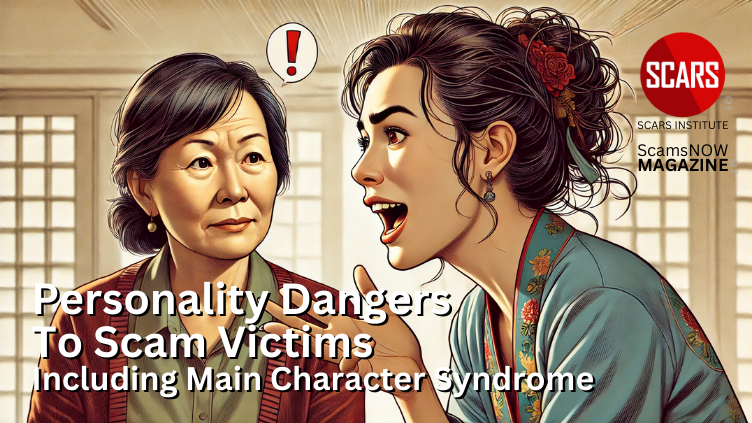Unseen but Devastating: The Global Urgency to Address Scams and Cybercrime
The Hidden Crisis: Why Scams and Cybercrime Deserve Greater Global Attention
Primary Category: Editorial & Commentary
Intended Audience: Scam Victims-Survivors / Family & Friends / General Public / Others
Author:
• Tim McGuinness, Ph.D., DFin, MCPO, MAnth – Anthropologist, Scientist, Polymath, Director of the Society of Citizens Against Relationship Scams Inc.
About This Article
Scams, fraud, and cybercrime represent the largest and most economically damaging crime category in the world, with annual losses exceeding $3-6 trillion. These crimes affect millions globally, crossing all demographics and representing the largest transfer of wealth in history.
Despite their immense impact, scams remain overshadowed by more visible yet less consequential crimes, such as immigration offenses, which dominate political and media narratives. This “visibility bias” skews public attention and policy priorities, leaving cybercrime units underfunded and enforcement efforts limited.
To address scams effectively, society must recalibrate its focus, reallocating resources based on evidence-driven harm, reframing narratives to emphasize their pervasive impact, and enhancing education and awareness efforts to equip individuals with tools for prevention and recovery. Only by prioritizing scams as a global crisis can we mitigate their devastating effects and protect victims worldwide.

The Hidden Crisis: Why Scams and Cybercrime Deserve Greater Global Attention
Overview
-
Scams, fraud, and cybercrime constitute the largest and fastest-growing global crime category in history.
-
Scams are larger than human trafficking and drugs combined.
-
The overall economic impact is estimated to be between USD$3-6 TRILLION dollars per year.
-
China, West Africa, India, and Brazil are its heart, but organized scammers are in every country.
-
People die from scams every single day.
-
Scams target the elderly, the very young, and everyone in between – no age or demographic is safe – everyone becomes a victim and everyone will become a victim.
-
Scams represent the largest transfer of wealth in the history of the world.
-
Scams Fraud and Cybercrime represent the world’s 3rd largest GDP – only less than the U.S. & China.
-
Public discourse and policy focus disproportionately favor high-profile but less impactful crimes.
-
Limited public and political attention creates systemic barriers to tackling scams effectively.
The Current Crime Prioritization Problem
Crimes that dominate public and political discourse often align with their visibility, not necessarily their impact. For example, in the United States, immigration-related offenses frequently occupy center stage in political rhetoric and media coverage. Politicians and commentators regularly discuss border security, asylum applications, and related enforcement. While these issues carry undeniable significance, their prevalence overshadows crimes like scams and cybercrime, which affect exponentially more people and have far greater economic implications.
Criminological research highlights this “visibility bias” as a major barrier to prioritizing impactful but less publicized crimes. As sociologist David Garland notes in his study of crime and social control, “media amplification creates a distorted hierarchy of crime concerns, favoring the sensational over the substantive.” This misalignment between perceived and actual threat levels leads to a policy landscape ill-equipped to address pervasive crimes like fraud.
The Scale and Scope of Scams and Cybercrime
Scams and cybercrime are pervasive and devastating. According to a 2022 report by the United Nations Office on Drugs and Crime (UNODC), cybercrime costs the global economy an estimated $8 trillion annually—a figure larger than the GDP of most nations. These crimes affect individuals, corporations, and governments alike, eroding trust and creating a ripple effect across industries.
According to a 2023 Gallup poll, 8% of U.S. adults reported being scammed within the past year (2022-2023,) which translates to roughly 21 million Americans being victims of scams in just one year, highlighting a significant rise in scam activity across the country; this data was collected in collaboration with the Stop Scams Alliance nonprofit organization. Based on this over 60 million U.S. residents are scam victims.
Key statistics illustrate the gravity of this issue:
-
Economic Impact: The Federal Trade Commission (FTC) reported that Americans lost $8.8 billion to scams in 2022, a 30% increase from the previous year. But since less than 5% of victims report these crimes (per the FBI) this number is likely 20x or more larger.
-
Prevalence: One in four adults in the U.S. has experienced some form of cyber fraud. But it may be 1 in 1.5 since so few report.
-
Vulnerability: Elderly individuals, teens, and marginalized communities are disproportionately targeted, compounding existing inequalities. However, in the end, everyone will be targeted and every economic activity.
Despite these alarming figures, scams and fraud receive minimal airtime compared to crimes with more tangible narratives. Immigration offenses, for instance, are routinely framed in terms of borders, sovereignty, and national identity, offering clear storylines that resonate with audiences. Scams, by contrast, often involve faceless perpetrators and complex methods, with victims that are often universally blamed, making them less compelling to cover.
Why Visibility Matters
Public perception heavily influences crime policy. High-profile crimes—such as violent offenses or drug-related arrests—often lead to immediate and robust governmental responses. Criminologist Stanley Cohen’s theory of “moral panics” explains how media and political attention can amplify certain crimes, creating a sense of urgency that drives policy action. In contrast, crimes like scams and cyber fraud operate in the shadows, receiving scant attention despite their widespread impact.
This discrepancy has real-world consequences. Limited visibility and reporting means fewer resources for prevention, investigation, and enforcement. While crimes like immigration violations or street-level drug offenses receive dedicated task forces and substantial budgets, cybercrime units remain universally underfunded and understaffed.
For example:
-
The U.S. Department of Homeland Security’s immigration enforcement budget exceeds $25 billion annually.
-
By comparison, the FBI’s entire cybercrime budget is less than $1 billion and resulted in less than 500 scammer & cybercriminal arrests per year.
Addressing the Root Causes of Attention Bias
To prioritize scams and cybercrime effectively, systemic changes are needed in how society perceives and addresses crime in general, and these crimes specifically.
These include:
-
Reframing Narratives: Media outlets and policymakers must shift their focus from sensationalism and the exploitive to substance. Highlighting the personal stories of scam victims and the societal costs of cybercrime can create emotional resonance, sustaining greater public engagement.
-
Data-Driven Prioritization: Policymakers should allocate resources based on empirical evidence of harm, that includes realistic projections not just reports, rather than media-driven narratives. For instance, directing more funding toward scams and cybercrime units would reflect the economic and social toll of these offenses.
-
Education and Awareness: Public awareness campaigns can demystify scams and cyber fraud and more importantly the psychological damage being done to our peoples, making them more relatable and comprehensible. Educational initiatives should focus on prevention, equipping individuals with the tools to recognize and avoid scams, and equally important to find the help they need in mental healthcare and recovery – this is a primary focus of the SCARS Institute.
Clearing the Conversation
To fully address scams and cybercrime, society must first confront and resolve competing crime narratives. High-profile issues like immigration crime dominate because they are perceived as immediate and visible threats. By addressing these concerns and reallocating attention and resources, the global community can create space to focus on crimes that, while less visible, are far more impactful.
Consider the analogy of clearing a cluttered desk. Tackling the visible items first creates room to address deeper, systemic issues. In the same vein, resolving contentious but less impactful crimes allows policymakers and the public to concentrate on scams, fraud, and cybercrime. This approach does not diminish the importance of high-profile crimes but recognizes the need for proportional attention.
Conclusion
Scams and cybercrime represent an urgent and ever-growing crisis. Yet their invisibility in large-scale public discourse and policymaking hinders effective action. Addressing this imbalance requires a fundamental shift in how society prioritizes crime—one that values impact over visibility. By clearing the conversational space and focusing on evidence-based harm, governments and communities can allocate resources where they are needed most, ensuring a safer and more equitable future for victim-survivors and society as a whole.
To learn more about the SCARS Institute™ visit www.AgainstScams.org
To contact us email us at contact@AgainstScams.org
Tim McGuinness, Ph.D., DFin, MCPO, MAnth Managing Director (Volunteer), SCARS Institute (Society of Citizens Against Relationship Scams Inc.) Miami Florida USA, Monterrey NL Mexico, Poland, Japan, and Worldwide
SCARS Institute is a proud partner of the Global Cyber Alliance
ScamVictimsSupport.org SCARSeducation.org AgainstScams.org RomanceScamsNOW.com ScamsNOW.com ScamPsychology.org AnyScam.org
Reprinted from X: https://x.com/RomanceScamsNow/status/1880814290346598566
-/ 30 /-
What do you think about this?
Please share your thoughts in a comment below!
Statement About Victim Blaming
SCARS Institute articles examine different aspects of the scam victim experience, as well as those who may have been secondary victims. This work focuses on understanding victimization through the science of victimology, including common psychological and behavioral responses. The purpose is to help victims and survivors understand why these crimes occurred, reduce shame and self-blame, strengthen recovery programs and victim opportunities, and lower the risk of future victimization.
At times, these discussions may sound uncomfortable, overwhelming, or may be mistaken for blame. They are not. Scam victims are never blamed. Our goal is to explain the mechanisms of deception and the human responses that scammers exploit, and the processes that occur after the scam ends, so victims can better understand what happened to them and why it felt convincing at the time, and what the path looks like going forward.
Articles that address the psychology, neurology, physiology, and other characteristics of scams and the victim experience recognize that all people share cognitive and emotional traits that can be manipulated under the right conditions. These characteristics are not flaws. They are normal human functions that criminals deliberately exploit. Victims typically have little awareness of these mechanisms while a scam is unfolding and a very limited ability to control them. Awareness often comes only after the harm has occurred.
By explaining these processes, these articles help victims make sense of their experiences, understand common post-scam reactions, and identify ways to protect themselves moving forward. This knowledge supports recovery by replacing confusion and self-blame with clarity, context, and self-compassion.
Additional educational material on these topics is available at ScamPsychology.org – ScamsNOW.com and other SCARS Institute websites.
-/ 30 /-
What do you think about this?
Please share your thoughts in a comment below!
2 Comments
Leave A Comment
Important Information for New Scam Victims
- Please visit www.ScamVictimsSupport.org – a SCARS Website for New Scam Victims & Sextortion Victims.
- SCARS Institute now offers its free, safe, and private Scam Survivor’s Support Community at www.SCARScommunity.org – this is not on a social media platform, it is our own safe & secure platform created by the SCARS Institute especially for scam victims & survivors.
- SCARS Institute now offers a free recovery learning program at www.SCARSeducation.org.
- Please visit www.ScamPsychology.org – to more fully understand the psychological concepts involved in scams and scam victim recovery.
If you are looking for local trauma counselors, please visit counseling.AgainstScams.org
If you need to speak with someone now, you can dial 988 or find phone numbers for crisis hotlines all around the world here: www.opencounseling.com/suicide-hotlines
Statement About Victim Blaming
Some of our articles discuss various aspects of victims. This is both about better understanding victims (the science of victimology) and their behaviors and psychology. This helps us to educate victims/survivors about why these crimes happened and not to blame themselves, better develop recovery programs, and help victims avoid scams in the future. At times, this may sound like blaming the victim, but it does not blame scam victims; we are simply explaining the hows and whys of the experience victims have.
These articles, about the Psychology of Scams or Victim Psychology – meaning that all humans have psychological or cognitive characteristics in common that can either be exploited or work against us – help us all to understand the unique challenges victims face before, during, and after scams, fraud, or cybercrimes. These sometimes talk about some of the vulnerabilities the scammers exploit. Victims rarely have control of them or are even aware of them, until something like a scam happens, and then they can learn how their mind works and how to overcome these mechanisms.
Articles like these help victims and others understand these processes and how to help prevent them from being exploited again or to help them recover more easily by understanding their post-scam behaviors. Learn more about the Psychology of Scams at www.ScamPsychology.org
SCARS INSTITUTE RESOURCES:
If You Have Been Victimized By A Scam Or Cybercrime
♦ If you are a victim of scams, go to www.ScamVictimsSupport.org for real knowledge and help
♦ SCARS Institute now offers its free, safe, and private Scam Survivor’s Support Community at www.SCARScommunity.org/register – this is not on a social media platform, it is our own safe & secure platform created by the SCARS Institute especially for scam victims & survivors.
♦ Enroll in SCARS Scam Survivor’s School now at www.SCARSeducation.org
♦ To report criminals, visit https://reporting.AgainstScams.org – we will NEVER give your data to money recovery companies like some do!
♦ Follow us and find our podcasts, webinars, and helpful videos on YouTube: https://www.youtube.com/@RomancescamsNowcom
♦ Learn about the Psychology of Scams at www.ScamPsychology.org
♦ Dig deeper into the reality of scams, fraud, and cybercrime at www.ScamsNOW.com and www.RomanceScamsNOW.com
♦ Scam Survivor’s Stories: www.ScamSurvivorStories.org
♦ For Scam Victim Advocates visit www.ScamVictimsAdvocates.org
♦ See more scammer photos on www.ScammerPhotos.com
You can also find the SCARS Institute’s knowledge and information on Facebook, Instagram, X, LinkedIn, and TruthSocial
Psychology Disclaimer:
All articles about psychology and the human brain on this website are for information & education only
The information provided in this and other SCARS articles are intended for educational and self-help purposes only and should not be construed as a substitute for professional therapy or counseling.
Note about Mindfulness: Mindfulness practices have the potential to create psychological distress for some individuals. Please consult a mental health professional or experienced meditation instructor for guidance should you encounter difficulties.
While any self-help techniques outlined herein may be beneficial for scam victims seeking to recover from their experience and move towards recovery, it is important to consult with a qualified mental health professional before initiating any course of action. Each individual’s experience and needs are unique, and what works for one person may not be suitable for another.
Additionally, any approach may not be appropriate for individuals with certain pre-existing mental health conditions or trauma histories. It is advisable to seek guidance from a licensed therapist or counselor who can provide personalized support, guidance, and treatment tailored to your specific needs.
If you are experiencing significant distress or emotional difficulties related to a scam or other traumatic event, please consult your doctor or mental health provider for appropriate care and support.
Also read our SCARS Institute Statement about Professional Care for Scam Victims – click here
If you are in crisis, feeling desperate, or in despair, please call 988 or your local crisis hotline – international numbers here.
More ScamsNOW.com Articles
A Question of Trust
At the SCARS Institute, we invite you to do your own research on the topics we speak about and publish. Our team investigates the subject being discussed, especially when it comes to understanding the scam victims-survivors’ experience. You can do Google searches, but in many cases, you will have to wade through scientific papers and studies. However, remember that biases and perspectives matter and influence the outcome. Regardless, we encourage you to explore these topics as thoroughly as you can for your own awareness.















![NavyLogo@4x-81[1] Unseen but Devastating: The Global Urgency to Address Scams and Cybercrime - 2025](https://scamsnow.com/wp-content/uploads/2025/04/NavyLogo@4x-811.png)










![scars-institute[1] Unseen but Devastating: The Global Urgency to Address Scams and Cybercrime - 2025](https://scamsnow.com/wp-content/uploads/2025/04/scars-institute1.png)

![niprc1.png1_-150×1501-1[1] Unseen but Devastating: The Global Urgency to Address Scams and Cybercrime - 2025](https://scamsnow.com/wp-content/uploads/2025/04/niprc1.png1_-150x1501-11.webp)
Bedankt voor dit artikel!
You are very welcome.